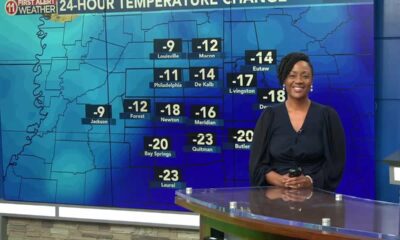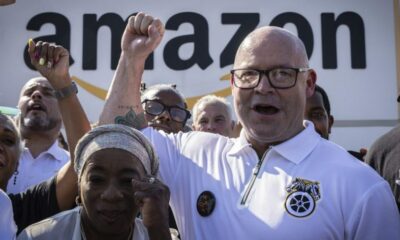Kaiser Health News
America’s Health System Isn’t Ready for the Surge of Seniors With Disabilities
Judith Graham
Wed, 17 Jan 2024 10:00:00 +0000
The number of older adults with disabilities — difficulty with walking, seeing, hearing, memory, cognition, or performing daily tasks such as bathing or using the bathroom — will soar in the decades ahead, as baby boomers enter their 70s, 80s, and 90s.
But the health care system isn’t ready to address their needs.
That became painfully obvious during the covid-19 pandemic, when older adults with disabilities had trouble getting treatments and hundreds of thousands died. Now, the Department of Health and Human Services and the National Institutes of Health are targeting some failures that led to those problems.
One initiative strengthens access to medical treatments, equipment, and web-based programs for people with disabilities. The other recognizes that people with disabilities, including older adults, are a separate population with special health concerns that need more research and attention.
Lisa Iezzoni, 69, a professor at Harvard Medical School who has lived with multiple sclerosis since her early 20s and is widely considered the godmother of research on disability, called the developments “an important attempt to make health care more equitable for people with disabilities.”
“For too long, medical providers have failed to address change in society, changes in technology, and changes in the kind of assistance that people need,” she said.
Among Iezzoni’s notable findings published in recent years:
Most doctors are biased. In survey results published in 2021, 82% of physicians admitted they believed people with significant disabilities have a worse quality of life than those without impairments. Only 57% said they welcomed disabled patients.
“It’s shocking that so many physicians say they don’t want to care for these patients,” said Eric Campbell, a co-author of the study and professor of medicine at the University of Colorado.
While the findings apply to disabled people of all ages, a larger proportion of older adults live with disabilities than younger age groups. About one-third of people 65 and older — nearly 19 million seniors — have a disability, according to the Institute on Disability at the University of New Hampshire.
Doctors don’t understand their responsibilities. In 2022, Iezzoni, Campbell, and colleagues reported that 36% of physicians had little to no knowledge of their responsibilities under the 1990 Americans With Disabilities Act, indicating a concerning lack of training. The ADA requires medical practices to provide equal access to people with disabilities and accommodate disability-related needs.
Among the practical consequences: Few clinics have height-adjustable tables or mechanical lifts that enable people who are frail or use wheelchairs to receive thorough medical examinations. Only a small number have scales to weigh patients in wheelchairs. And most diagnostic imaging equipment can’t be used by people with serious mobility limitations.
Iezzoni has experienced these issues directly. She relies on a wheelchair and can’t transfer to a fixed-height exam table. She told me she hasn’t been weighed in years.
Among the medical consequences: People with disabilities receive less preventive care and suffer from poorer health than other people, as well as more coexisting medical conditions. Physicians too often rely on incomplete information in making recommendations. There are more barriers to treatment and patients are less satisfied with the care they do get.
Egregiously, during the pandemic, when crisis standards of care were developed, people with disabilities and older adults were deemed low priorities. These standards were meant to ration care, when necessary, given shortages of respirators and other potentially lifesaving interventions.
There’s no starker example of the deleterious confluence of bias against seniors and people with disabilities. Unfortunately, older adults with disabilities routinely encounter these twinned types of discrimination when seeking medical care.
Such discrimination would be explicitly banned under a rule proposed by HHS in September. For the first time in 50 years, it would update Section 504 of the Rehabilitation Act of 1973, a landmark statute that helped establish civil rights for people with disabilities.
The new rule sets specific, enforceable standards for accessible equipment, including exam tables, scales, and diagnostic equipment. And it requires that electronic medical records, medical apps, and websites be made usable for people with various impairments and prohibits treatment policies based on stereotypes about people with disabilities, such as covid-era crisis standards of care.
“This will make a really big difference to disabled people of all ages, especially older adults,” said Alison Barkoff, who heads the HHS Administration for Community Living. She expects the rule to be finalized this year, with provisions related to medical equipment going into effect in 2026. Medical providers will bear extra costs associated with compliance.
Also in September, NIH designated people with disabilities as a population with health disparities that deserves further attention. This makes a new funding stream available and “should spur data collection that allows us to look with greater precision at the barriers and structural issues that have held people with disabilities back,” said Bonnielin Swenor, director of the Johns Hopkins University Disability Health Research Center.
One important barrier for older adults: Unlike younger adults with disabilities, many seniors with impairments don’t identify themselves as disabled.
“Before my mom died in October 2019, she became blind from macular degeneration and deaf from hereditary hearing loss. But she would never say she was disabled,” Iezzoni said.
Similarly, older adults who can’t walk after a stroke or because of severe osteoarthritis generally think of themselves as having a medical condition, not a disability.
Meanwhile, seniors haven’t been well integrated into the disability rights movement, which has been led by young and middle-aged adults. They typically don’t join disability-oriented communities that offer support from people with similar experiences. And they don’t ask for accommodations they might be entitled to under the ADA or the 1973 Rehabilitation Act.
Many seniors don’t even realize they have rights under these laws, Swenor said. “We need to think more inclusively about people with disabilities and ensure that older adults are fully included at this really important moment of change.”
——————————
By: Judith Graham
Title: America’s Health System Isn’t Ready for the Surge of Seniors With Disabilities
Sourced From: kffhealthnews.org/news/article/navigating-aging-seniors-with-disabilities-us-health-system-unprepared/
Published Date: Wed, 17 Jan 2024 10:00:00 +0000
Did you miss our previous article…
https://www.biloxinewsevents.com/im-not-safe-here-schools-ignore-federal-rules-on-restraint-and-seclusion/
Kaiser Health News
LGBTQ+ People Relive Old Traumas as They Age on Their Own
SUMMARY: Bill Hall, a 71-year-old HIV survivor, has endured numerous health challenges, including depression, heart disease, and cancer since contracting the virus in 1986. His struggles are compounded by trauma from childhood, where he faced bullying and abuse in a government boarding school. LGBTQ+ seniors like Hall often face isolation, with many living alone and lacking social support. By 2030, the number of LGBTQ+ seniors is projected to double, increasing their vulnerability to health issues and mental struggles. Many have experienced profound loss from the AIDS crisis, leading to ongoing emotional challenges. Support services remain critical for this aging population.
The post LGBTQ+ People Relive Old Traumas as They Age on Their Own appeared first on kffhealthnews.org
Kaiser Health News
Caseworkers Coax Homeless People out of Las Vegas’ Tunnels for Treatment
SUMMARY: In Las Vegas, case manager Bryon Johnson searches the underground tunnels for homeless individuals like Jay Flanders, who suffers from health issues and substance abuse. Escaping rising housing costs and law enforcement, around 1,200 to 1,500 people live in these tunnels, which provide shelter from extreme weather but pose significant health risks, especially during monsoon season. Outreach workers emphasize the dangers of drug addiction and untreated health conditions, urging residents to seek medical care above ground. As housing costs soar, many homeless individuals, including tourists, end up in these perilous conditions, seeking cover from societal judgment and harsh weather.
The post Caseworkers Coax Homeless People out of Las Vegas’ Tunnels for Treatment appeared first on kffhealthnews.org
Kaiser Health News
In Settling Fraud Case, New York Medicare Advantage Insurer, CEO Will Pay up to $100M
SUMMARY: Independent Health Association of Buffalo and Betsy Gaffney, CEO of medical analytics firm DxID, have agreed to a settlement of up to $100 million to resolve Justice Department allegations of fraudulent Medicare billing for exaggerated or non-existent health conditions. Independent Health will pay up to $98 million, while Gaffney will contribute $2 million. Neither party admitted wrongdoing. The case was triggered by whistleblower Teresa Ross, highlighting issues of “upcoding” in Medicare Advantage plans. Ross, having faced repercussions for her allegations, will receive at least $8.2 million from the settlement. This case underscores the challenges of regulating billing practices in the Medicare system.
The post In Settling Fraud Case, New York Medicare Advantage Insurer, CEO Will Pay up to $100M appeared first on kffhealthnews.org
-

 Local News5 days ago
Local News5 days agoHard Rock Hotel & Casino Biloxi Honors Veterans with Wreath-Laying Ceremony and Holiday Giving Initiative
-

 News from the South - North Carolina News Feed5 days ago
News from the South - North Carolina News Feed5 days agoSocial Security benefits boosted for millions in bill headed to Biden’s desk • NC Newsline
-

 Local News5 days ago
Local News5 days agoMDOT suspends work, urges safe driving for holiday travel
-

 Mississippi News Video6 days ago
Mississippi News Video6 days ago12/19- Friday will be breezy…but FREEZING by this weekend
-

 News from the South - Missouri News Feed6 days ago
News from the South - Missouri News Feed6 days agoCould prime Albert Pujols fetch $1 billion in today's MLB free agency?
-

 Our Mississippi Home5 days ago
Our Mississippi Home5 days agoGreen Christmas Gifts for Critters and Yourself
-

 Local News7 days ago
Local News7 days agoTrump calls for abolishing the debt ceiling
-

 News from the South - Texas News Feed7 days ago
News from the South - Texas News Feed7 days agoAmazon workers strike at facilities around the country as Teamsters seek contract




































